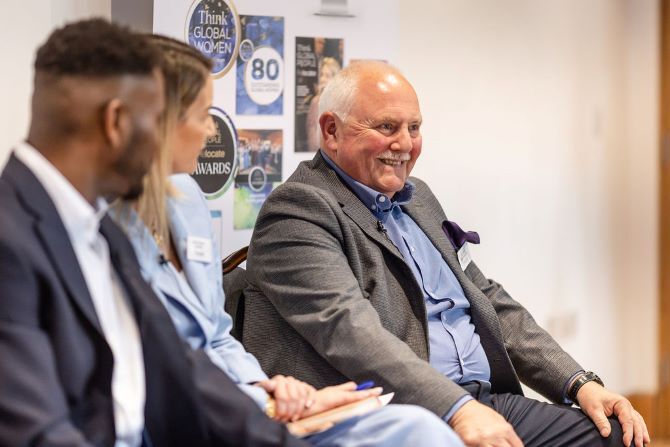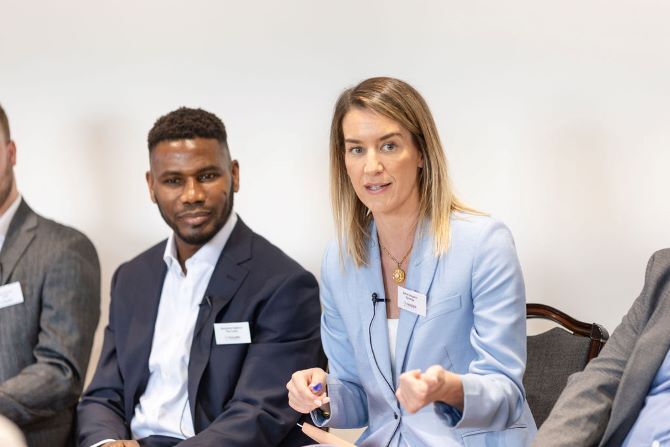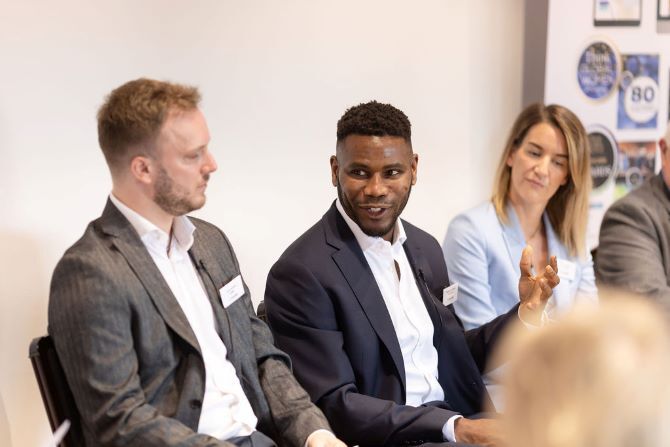Charting the road to 2030: what does the future hold for global mobility?
Fiona Murchie, Relocate‘s publisher and managing editor, brought together senior global mobility leaders, HR professionals, educators, destination service providers, tax and immigration specialists and strategists for the Global Leaders Forum: Forging a Path in Our Fragile World at the Glaziers Hall in London this month.

This article is taken from the Summer 2025 issue of
Think Global People magazine
View your copy of the Summer 2025 issue of Think Global People magazine.The “Question Time”-style event brought together panellists from across sectors to explore how organisations can adapt, lead, and thrive in today’s volatile world. In a world increasingly defined by volatility and reinvention, Fiona introduced the Forum and explained the reasoning for the event.“Geopolitical and economic tensions are rife, and there are political changes and regulatory shifts. AI is reshaping the future of work and there is rapid technological change,” she said.She asked attendees to think about the political, economic, social, technological, legal, and environmental changes which would challenge and change their business over the next five years. She emphasised that now was the time to reimagine talent pipelines, to consider how education systems must evolve and how borderless workforces and AI augmented workflows will reshape everything from tax codes to talent retention. The question she posed: What are your drivers of change for 2030? was as much about mindset as it was about policy or planning.“I would like you to think about what the world looks and feels like in 2030 for you and your organisation and think of a future scenario in which your business must survive and thrive,” she said.
The panellists were:
John Rason, Group Head of Consulting,Santa Fe RelocationJosh Winfield, Senior Manager, Global Mobility Consulting,
KPMGMike Lambert, Global Education Director,
Inspired EducationSofia Oragano, Senior Director International Sales,
SynergyBenjamin Oghene, CEO & Founder,
The CozmThe panel was chaired by Relocate journalist and broadcaster Marianne Curphey, who facilitated the panel discussion on the trends in global mobility, and the need for honest and collaborative dialogue focussing on the future, shared learning, and forward thinking. The discussion which followed was enlightening, collaborative and provided some real insights into how the industry might change in the coming years.
Navigating the perfect storm: John Rason on the new role of global mobility
 Starting the discussion, John Rason, Group Head of Consulting at Santa Fe Relocation, spoke candidly about an industry and a world in flux and how the global mobility industry was facing a “perfect storm”.“It’s very volatile. It’s very unpredictable,” he said. “We are not just dealing with geopolitical uncertainty, we are dealing with a transformed world of work.” The pace of change in global mobility, he explained, has accelerated beyond anything most of us have experienced in the past.“If you now look at the way the world is changing, the dynamics, the AI, the commerce, with all the shocks which are happening in the world, the ability to use what you did in the past and extrapolate that to predict the future is no longer possible,” he said.He explained how tariff shifts, immigration changes, and ongoing geopolitical instability are now the new normal. The pandemic, which now seems like a distant memory, has instead become a turning point in how businesses and individuals approach work, life, and cross-border movement.“Businesses could use their past experiences to forecast the future,” John Rason said. “Today, that model no longer holds.” Instead of relying on models from the past, forward-thinking companies are reimagining their structures and how they leverage talent globally. The most successful are those willing to reinvent themselves—adapting resources, embracing flexible working models, and building in business resilience.For him, the COVID-19 pandemic was not just a public health crisis—it was a paradigm shift that permanently altered our behaviour and our expectations and changed the world of work. He shared a personal anecdote about how his neighbour heads global IT for a Dutch company while living in High Wycombe, England.People are no longer tied to one location. They are asking to extend holidays into working trips, and rethinking what a workplace even looks like.
Starting the discussion, John Rason, Group Head of Consulting at Santa Fe Relocation, spoke candidly about an industry and a world in flux and how the global mobility industry was facing a “perfect storm”.“It’s very volatile. It’s very unpredictable,” he said. “We are not just dealing with geopolitical uncertainty, we are dealing with a transformed world of work.” The pace of change in global mobility, he explained, has accelerated beyond anything most of us have experienced in the past.“If you now look at the way the world is changing, the dynamics, the AI, the commerce, with all the shocks which are happening in the world, the ability to use what you did in the past and extrapolate that to predict the future is no longer possible,” he said.He explained how tariff shifts, immigration changes, and ongoing geopolitical instability are now the new normal. The pandemic, which now seems like a distant memory, has instead become a turning point in how businesses and individuals approach work, life, and cross-border movement.“Businesses could use their past experiences to forecast the future,” John Rason said. “Today, that model no longer holds.” Instead of relying on models from the past, forward-thinking companies are reimagining their structures and how they leverage talent globally. The most successful are those willing to reinvent themselves—adapting resources, embracing flexible working models, and building in business resilience.For him, the COVID-19 pandemic was not just a public health crisis—it was a paradigm shift that permanently altered our behaviour and our expectations and changed the world of work. He shared a personal anecdote about how his neighbour heads global IT for a Dutch company while living in High Wycombe, England.People are no longer tied to one location. They are asking to extend holidays into working trips, and rethinking what a workplace even looks like.Expectations are changing—and employers must catch up
One of the most powerful takeaways from his comments was the realisation that employee expectations have dramatically evolved. “Five years ago, the idea of going into the office five days a week was unquestioned,” he said.“Mobility sits at the intersection of all this. It’s no longer about moving assignees from A to B. It’s about enabling a fluid, dynamic workforce—often in real-time and under mounting pressures.”At the same time, mobility teams today face the challenge of having to achieve more with less.“There is cost pressure. There is compliance pressure. There is tech that’s often outdated,” John Rason said. “And yet mobility professionals are expected to be all things to all people.”He described how, all too often, global mobility is brought into the conversation only after critical decisions have been made, frequently without input from the people who understand the true risks, limitations, and opportunities of cross-border work. Mobility professionals must now juggle skills that go far beyond logistics and make sure that their voice is heard in the boardroom.John explained the dilemma of a colleague who worked in a technology company, which had been recruiting a lot of international staff in order to get round expatriate assignments.“They have been doing lots of international hires,” he explained. “They did a head count and they have got 8,000 international hires and the company has not thought about the immigration implications of that.”John’s three takeaways for business leaders:
- The global mobility function is no longer a back-office operation—it’s a strategic enabler that must evolve to remain relevant.
- Organisations must build resilience and flexibility into their talent strategies to keep pace with global change.
- Human presence still matters, especially in an AI-powered world, when it comes to customer experience, market insights, and relationship-building.
Corporate housing: a sector under pressure but finding creative solutions
 In a global mobility landscape undergoing radical change, the demand for flexible, safe, and often unconventional housing solutions is on the rise. Sophia Oragano, Senior Director International Sales, Synergy at Synergy, offered new insights into how the concept of corporate accommodation is being redefined as new markets open up and clients require housing in remote and unconventional locations.“Every customer is different,” she said. “Every assignment and every market brings new challenges. But at the heart of everything we do is traveller safety. That will always be essential, ensuring accommodation is safe, vetted, compliant, and meet at least the minimum requirements.”While established hubs like London, Paris, and Frankfurt remain key to the corporate housing market, Synergy is looking for creative solutions in new markets and more remote locations, and in some cases, finding alternative cities to those which are overcrowded or have no capacity.“We are being pushed further and further out from global cities,” she said. “We are seeing high demand emerging in new and often less traditional markets, for example in Debrecen, Hungary, where we have just completed a large project.”That project required Synergy to stretch the definition of corporate housing. “We used hostel-style accommodation for a group of workers relocating there. It is not just serviced apartments and aparthotels anymore. We are talking handpicked homes, student housing, hostels, even caravans and mobile homes in some cases.”The market isn’t just changing geographically, there are also new and interesting demographics emerging, including rising demand from the education sector, for instance, with universities and research institutions increasingly seeking extended-stay accommodation for faculty and international students, especially those who have a large budget to spend on relatively short-term lets.This diversification has required housing providers to shift their mindset and expand their networks, both in terms of locations and types of housing stock.In rapidly developing regions, infrastructure is under pressure. “If you look at India, for example,” she said, “cities like Bangalore and Hyderabad are at capacity. They can’t expand up or out anymore. So investment is moving into tier two and tier three cities, and we are following that movement.”This means corporate housing providers must now build deeper expertise in less-established markets, often with little or no existing accommodation infrastructure, while maintaining service levels and transparency.One of her key messages was the importance of honesty and expectation-setting. “We have to be realistic with clients about what’s possible in these locations. If the housing doesn’t exist, we can offer alternative solutions that still meet the safety and comfort needs of travellers.”
In a global mobility landscape undergoing radical change, the demand for flexible, safe, and often unconventional housing solutions is on the rise. Sophia Oragano, Senior Director International Sales, Synergy at Synergy, offered new insights into how the concept of corporate accommodation is being redefined as new markets open up and clients require housing in remote and unconventional locations.“Every customer is different,” she said. “Every assignment and every market brings new challenges. But at the heart of everything we do is traveller safety. That will always be essential, ensuring accommodation is safe, vetted, compliant, and meet at least the minimum requirements.”While established hubs like London, Paris, and Frankfurt remain key to the corporate housing market, Synergy is looking for creative solutions in new markets and more remote locations, and in some cases, finding alternative cities to those which are overcrowded or have no capacity.“We are being pushed further and further out from global cities,” she said. “We are seeing high demand emerging in new and often less traditional markets, for example in Debrecen, Hungary, where we have just completed a large project.”That project required Synergy to stretch the definition of corporate housing. “We used hostel-style accommodation for a group of workers relocating there. It is not just serviced apartments and aparthotels anymore. We are talking handpicked homes, student housing, hostels, even caravans and mobile homes in some cases.”The market isn’t just changing geographically, there are also new and interesting demographics emerging, including rising demand from the education sector, for instance, with universities and research institutions increasingly seeking extended-stay accommodation for faculty and international students, especially those who have a large budget to spend on relatively short-term lets.This diversification has required housing providers to shift their mindset and expand their networks, both in terms of locations and types of housing stock.In rapidly developing regions, infrastructure is under pressure. “If you look at India, for example,” she said, “cities like Bangalore and Hyderabad are at capacity. They can’t expand up or out anymore. So investment is moving into tier two and tier three cities, and we are following that movement.”This means corporate housing providers must now build deeper expertise in less-established markets, often with little or no existing accommodation infrastructure, while maintaining service levels and transparency.One of her key messages was the importance of honesty and expectation-setting. “We have to be realistic with clients about what’s possible in these locations. If the housing doesn’t exist, we can offer alternative solutions that still meet the safety and comfort needs of travellers.”Sophia Oragano’s three takeaways for business leaders:
- The definition of corporate housing is expanding rapidly—from aparthotels to hostels, student housing, and even mobile homes—driven by geographic shifts and market constraints.
- Demand is growing in tier two and tier three cities, especially in emerging markets, requiring new levels of local knowledge and investment from providers.
- Transparency, flexibility, and expectation-setting are now critical elements of delivering successful housing solutions in less traditional locations.
Automation, diversity and the future of mobility: Benjamin Oghene on rethinking global talent models
 As the demands on global mobility functions evolve, one question continues to dominate: how can we adapt faster, smarter, and more inclusively? For Benjamin Oghene, CEO and founder of The Cozm, the answer lies in blending intelligent automation with human insight and knowing when to apply each. He explained how heavily repetitive processes currently performed by humans are being done in a matter of minutes or days by AI-enabled technology, a combination which he called “augmented intelligence”.For example, when making a visa application, The Cozm’s technology uses predictive analytics to forecast which applications are likely to be rejected by authorities before they are even submitted, something which no human would be able to know.“This is about doing what machines do best, fast, accurate, data-driven work so humans can focus on relationship-building and high-impact decision-making,” he said.He also offered a unique perspective on how AI can potentially both solve and replicate bias in global hiring. Reflecting on his time at Unilever, he described how the company replaced first-round interviews in one recruitment programme with AI interviews, while keeping second-round interviews conducted by humans. “Within 12 months, gender diversity improved by 14 per cent, and we cut recruitment costs by a million. That combination, AI plus human, was far more effective than either alone,” he explained.However, he cautioned that AI itself can be biased. One major source of bias is the training data. If it lacks diversity, or if the developers of the model come from a narrow demographic, then there is more likely to be bias in the system.Organisations also need to think more carefully about who is sent on assignment, and why. AI augmented systems can help global mobility departments where talent exists already. He cited the example of an oil and gas company which was sending people from Houston to Lagos, even though there was plenty of qualified talent in Lagos, including locals who spoke English and understand the market. The company just was not using data to guide those decisions and was using an outdated mindset to think about how to find and use talent.
As the demands on global mobility functions evolve, one question continues to dominate: how can we adapt faster, smarter, and more inclusively? For Benjamin Oghene, CEO and founder of The Cozm, the answer lies in blending intelligent automation with human insight and knowing when to apply each. He explained how heavily repetitive processes currently performed by humans are being done in a matter of minutes or days by AI-enabled technology, a combination which he called “augmented intelligence”.For example, when making a visa application, The Cozm’s technology uses predictive analytics to forecast which applications are likely to be rejected by authorities before they are even submitted, something which no human would be able to know.“This is about doing what machines do best, fast, accurate, data-driven work so humans can focus on relationship-building and high-impact decision-making,” he said.He also offered a unique perspective on how AI can potentially both solve and replicate bias in global hiring. Reflecting on his time at Unilever, he described how the company replaced first-round interviews in one recruitment programme with AI interviews, while keeping second-round interviews conducted by humans. “Within 12 months, gender diversity improved by 14 per cent, and we cut recruitment costs by a million. That combination, AI plus human, was far more effective than either alone,” he explained.However, he cautioned that AI itself can be biased. One major source of bias is the training data. If it lacks diversity, or if the developers of the model come from a narrow demographic, then there is more likely to be bias in the system.Organisations also need to think more carefully about who is sent on assignment, and why. AI augmented systems can help global mobility departments where talent exists already. He cited the example of an oil and gas company which was sending people from Houston to Lagos, even though there was plenty of qualified talent in Lagos, including locals who spoke English and understand the market. The company just was not using data to guide those decisions and was using an outdated mindset to think about how to find and use talent.Benjamin Oghene’s three takeaways for business leaders
- Stop viewing peers solely as competitors. Many companies are so fixated on competition they miss what’s coming next. “Collaboration is key. We are partnering with other firms right now and each of us brings different expertise. Together, we can offer something far more powerful.”
- Discover how to learn effectively and efficiently: Most people think taking notes is the best study method but research shows it is one of the least effective. The new world of AI augmented work will require us all to learn and upskill constantly, whatever our age and job tole.
- Automate intelligently: AI can radically improve speed and accuracy in compliance and talent processes but works best when paired with human judgment and oversight.
Read related articles
- The evolving role of global mobility: from back office to strategic business partner
- The Future of education: Balancing innovation, inclusivity and wellbeing
- Interview with Benjamin Oghene, The Cozm
- The shape of mobility to come: strategy, technology, and leadership in a disrupted world
- Interview with Sofia Oragano, Senior Director of International Sales at Synergy
Education, AI, and preparing for the future of work
 In a world where technological advancement is accelerating at unprecedented pace, preparing young people for the future is no longer a straightforward task. Mike Lambert, Global Education Director at Inspired Education, explained that with AI, automation, and innovation reshaping every sector, educators are being asked to equip students not only with knowledge and the traditional curricula, but with adaptability, agency, and resilience.Schools have always operated on long timescales, educating children from birth to adulthood, but the rate of change in the world outside means traditional education models need to adapt to keep pace, he said.Inspired Education has already taken significant steps in this direction. The group has strategic partnerships with major tech companies, including Meta, and is exploring the educational potential of the metaverse. Virtual reality headsets are already in use across Inspired classrooms, giving students immersive experiences with emerging technology.Additionally, a partnership with Century Tech enables students to receive personalised support in English, maths and science through an AI-based system called Inspired AI. The platform analyses student responses, adapts tasks, and provides targeted feedback or instructional videos.However, Mike believes that use of technology is only half the picture. The next step is to equip students to become creators, innovators and responsible users of the huge potential that technology offers.Inspired Education is now exploring how to teach AI literacy and ethics from the very beginning of the school curriculum. One initiative, developed in collaboration with MIT, is called The Day of AI. It introduces students from Year 3 to Year 13 to core AI concepts including basic coding and AI ethics. MIT will ensure the programme is kept up to date, so that students are not learning last year’s curriculum when in the real world change has already take place.“If we’re not giving our children exposure to this technology now, they won’t be ready for the future we’re heading into,” he said.This also includes fostering what Mike calls entrepreneurial mindedness. This is not necessarily about starting a business, but about having the mindset to be agile, innovative thinkers within organisations. In a world where job roles and industries are shifting rapidly, these traits will become increasingly vital, he said.
In a world where technological advancement is accelerating at unprecedented pace, preparing young people for the future is no longer a straightforward task. Mike Lambert, Global Education Director at Inspired Education, explained that with AI, automation, and innovation reshaping every sector, educators are being asked to equip students not only with knowledge and the traditional curricula, but with adaptability, agency, and resilience.Schools have always operated on long timescales, educating children from birth to adulthood, but the rate of change in the world outside means traditional education models need to adapt to keep pace, he said.Inspired Education has already taken significant steps in this direction. The group has strategic partnerships with major tech companies, including Meta, and is exploring the educational potential of the metaverse. Virtual reality headsets are already in use across Inspired classrooms, giving students immersive experiences with emerging technology.Additionally, a partnership with Century Tech enables students to receive personalised support in English, maths and science through an AI-based system called Inspired AI. The platform analyses student responses, adapts tasks, and provides targeted feedback or instructional videos.However, Mike believes that use of technology is only half the picture. The next step is to equip students to become creators, innovators and responsible users of the huge potential that technology offers.Inspired Education is now exploring how to teach AI literacy and ethics from the very beginning of the school curriculum. One initiative, developed in collaboration with MIT, is called The Day of AI. It introduces students from Year 3 to Year 13 to core AI concepts including basic coding and AI ethics. MIT will ensure the programme is kept up to date, so that students are not learning last year’s curriculum when in the real world change has already take place.“If we’re not giving our children exposure to this technology now, they won’t be ready for the future we’re heading into,” he said.This also includes fostering what Mike calls entrepreneurial mindedness. This is not necessarily about starting a business, but about having the mindset to be agile, innovative thinkers within organisations. In a world where job roles and industries are shifting rapidly, these traits will become increasingly vital, he said.Watch video highlights of Global Leaders Forum
Education at the heart of Global Mobility
Beyond the classroom, he said education can play a key role in facilitating the success of global mobility assignments. For internationally mobile families, education plays a key role in the success or failure of a relocation. Schools that cater to globally mobile communities must understand the emotional and academic challenges children face when transitioning between systems and cultures, he said.Mike Lambert’s three takeaways for business leaders
- Remain open minded and ready to learn - it doesn't just start and end in school, it carries on from that point forward, right the way through our working careers.
- Be curious and willing to embrace lifelong learning.
- Understand that a relocation may only be successful if the whole family is happy, and schools can provide education as well as community for children and their parents.
Understanding the impact that global mobility can make
 Josh Winfield, Senior Manager, Global Mobility Consulting at KPMG, explained that global mobility is changing fast, and it is no longer just about logistics, compliance and tax. It is becoming a core part of how organisations think about talent, leadership, and global growth. That means thinking about mobility as something far more expansive than it once was, and embracing new tools and ways of working, especially around artificial intelligence.He said that traditionally, mobility teams sat within tax or legal departments, focused on the logistics of moving people from one country to another. But that model is outdated. Increasingly, mobility is a people and talent issue—about how organisations find, grow and retain their best people across borders. That shift also reflects growing expectations from clients and assignees. They want the move to work not just on paper, but in reality for the employees and for their family.Mobility teams have a key role to play in the talent pipeline, to make sure that they are voicing their role around talent management to those who are looking at succession planning, at recruitment, and those who are looking at developing those future leaders.KPMG, like many firms, is investing heavily in AI. Yet while technology plays a key role, Josh Winfield is clear that mobility still comes down to people, and one of the biggest reasons assignments fail is because the family is not happy.That means policy needs to go beyond just the employee. Support for spouses, partners, and children is critical because if they don’t settle, the whole move can unravel.“In many cases, these family members haven’t chosen the move themselves and so helping them find purpose, connection, and support is essential,” he said.Another important shift is that organisations are moving fewer people on long-term assignments. Instead, they're favouring short-term moves, secondments, or business travel models where the family stays behind.“We are seeing a reduction in long term assignments and permanent moves on a global basis,” he said. “That is driven by cost pressures and the rise of AI. You now need to create a stronger business case to move someone and their families to a new location. Organisations are choosing instead to move people on a shorter term basis or combining it with a business trip, where actually the families stay at home. For many employees, that is more attractive as a proposition, rather than uprooting the entire family and their social network and support system to a new location.”However, fewer family moves may mean fewer students enrolling in international schools, or different demands on relocation services, so education and mobility providers need to adapt too.“Mobility isn’t just about moving people. It’s about making the move meaningful—for the business, for the employee, and for the family behind them.,” he said. “People are generally looking for four things, and I think that probably applies to children as much as adults.“They are looking for health support and that they are insured, they are looking for wealth, making sure that their pensions are being supported, and that they are building up wealth so they have the ability to return home or the ability to move to another country. They are looking to make sure that they are compliant,” he said“They don't want the stress of a tax return going wrong or having to pay a massive liability. On top of that is making sure that they have magical experience, something which is really going to integrate them in the culture of the new country. That could be something like going to a football game if they go to Spain and they get to go to the Real Madrid stadium. It is something which makes them feel valued as an employee. If you get those four elements right, wellness is taken care of, and hopefully the assignee will be happy and successful in their new location as well.”As for the world of work, he explained that at the moment, things are changing so rapidly that we cannot really prepare for such momentous change.“There is a danger of putting your head in the sand, but actually what we should be doing is saying the world is changing, it is not going to be the same as it is today,” he said. “It is not going to be the same as it is tomorrow. But that is an exciting prospect, and actually you need to really enjoy and learn all of these different things in the pipeline. Learn about AI, learn about what the capabilities are, because one day, you will be talking about it with everyone and it will be a core part of your day to day work. Don't be scared. Embrace it, because otherwise you will be left behind.”
Josh Winfield, Senior Manager, Global Mobility Consulting at KPMG, explained that global mobility is changing fast, and it is no longer just about logistics, compliance and tax. It is becoming a core part of how organisations think about talent, leadership, and global growth. That means thinking about mobility as something far more expansive than it once was, and embracing new tools and ways of working, especially around artificial intelligence.He said that traditionally, mobility teams sat within tax or legal departments, focused on the logistics of moving people from one country to another. But that model is outdated. Increasingly, mobility is a people and talent issue—about how organisations find, grow and retain their best people across borders. That shift also reflects growing expectations from clients and assignees. They want the move to work not just on paper, but in reality for the employees and for their family.Mobility teams have a key role to play in the talent pipeline, to make sure that they are voicing their role around talent management to those who are looking at succession planning, at recruitment, and those who are looking at developing those future leaders.KPMG, like many firms, is investing heavily in AI. Yet while technology plays a key role, Josh Winfield is clear that mobility still comes down to people, and one of the biggest reasons assignments fail is because the family is not happy.That means policy needs to go beyond just the employee. Support for spouses, partners, and children is critical because if they don’t settle, the whole move can unravel.“In many cases, these family members haven’t chosen the move themselves and so helping them find purpose, connection, and support is essential,” he said.Another important shift is that organisations are moving fewer people on long-term assignments. Instead, they're favouring short-term moves, secondments, or business travel models where the family stays behind.“We are seeing a reduction in long term assignments and permanent moves on a global basis,” he said. “That is driven by cost pressures and the rise of AI. You now need to create a stronger business case to move someone and their families to a new location. Organisations are choosing instead to move people on a shorter term basis or combining it with a business trip, where actually the families stay at home. For many employees, that is more attractive as a proposition, rather than uprooting the entire family and their social network and support system to a new location.”However, fewer family moves may mean fewer students enrolling in international schools, or different demands on relocation services, so education and mobility providers need to adapt too.“Mobility isn’t just about moving people. It’s about making the move meaningful—for the business, for the employee, and for the family behind them.,” he said. “People are generally looking for four things, and I think that probably applies to children as much as adults.“They are looking for health support and that they are insured, they are looking for wealth, making sure that their pensions are being supported, and that they are building up wealth so they have the ability to return home or the ability to move to another country. They are looking to make sure that they are compliant,” he said“They don't want the stress of a tax return going wrong or having to pay a massive liability. On top of that is making sure that they have magical experience, something which is really going to integrate them in the culture of the new country. That could be something like going to a football game if they go to Spain and they get to go to the Real Madrid stadium. It is something which makes them feel valued as an employee. If you get those four elements right, wellness is taken care of, and hopefully the assignee will be happy and successful in their new location as well.”As for the world of work, he explained that at the moment, things are changing so rapidly that we cannot really prepare for such momentous change.“There is a danger of putting your head in the sand, but actually what we should be doing is saying the world is changing, it is not going to be the same as it is today,” he said. “It is not going to be the same as it is tomorrow. But that is an exciting prospect, and actually you need to really enjoy and learn all of these different things in the pipeline. Learn about AI, learn about what the capabilities are, because one day, you will be talking about it with everyone and it will be a core part of your day to day work. Don't be scared. Embrace it, because otherwise you will be left behind.”Josh Winfield’s key takeaways for business leaders
- Embrace AI – not as an add-on, but as a central part of delivery.
- Rethink the purpose of your mobility function – it is now about talent, leadership, and growth.
- Put families first – because if the family doesn’t thrive, the move might not be a success.
Looking to the future – mobility can play a key role
Addressing a room filled with global mobility leaders, international project managers, talent experts, and educators, Fiona Murchie brought to a conclusion a lively discussion around the challenges we face today, as well as the ones we will need to address in the future. The Global Leaders Forum was an engaging and wide-ranging debate which brought thought-leaders from different parts of the industry together to discuss how to collaborate and share knowledge at a critical time for business and global mobility as a whole. Sharing in the Relocate Global and Think Global community, exchanging knowledge and collaborating with colleagues in the industry will help our organisations and our services stay relevant and connected, now and in this exciting but uncertain future for global mobility, she explained. She called on attendees to continue the discussion to navigate this new world of work.

Find out more about the Think Global People and Think Women community and events.
Subscribe to Relocate Extra, our monthly newsletter, to get all the latest international assignments and global mobility news.Relocate’s new Global Mobility Toolkit provides free information, practical advice and support for HR, global mobility managers and global teams operating overseas.
©2025 Re:locate magazine, published by Profile Locations, Spray Hill, Hastings Road, Lamberhurst, Kent TN3 8JB. All rights reserved. This publication (or any part thereof) may not be reproduced in any form without the prior written permission of Profile Locations. Profile Locations accepts no liability for the accuracy of the contents or any opinions expressed herein.



































